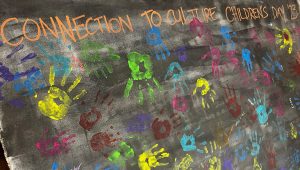 Today, the team were out at Parafield Gardens, celebrating National Aboriginal
Today, the team were out at Parafield Gardens, celebrating National Aboriginal
and Torres Strait Islander Children’s Day at the Aboriginal Family Support
Services ‘Connection to Culture Children’s Day’.
We had resources to give away for little ones (including colouring-in, temporary
tattoos and booklets) and fun activities like hand painting and a raffle to win
one of our special plush toys. Our beloved safety symbol for First Nations
children in care, Nunga Oog, popped in to say hi and have his photo taken throughout
the day!
It was great to connect with children, young people and their carers, to talk about rights in care, and how our office can support children who are having a hard time.
Images: (1) Nunga Oog and Oog out saying hi to children and families (2) Nunga oog temporary tattoo on child’s hand; (3) Shona
Reid with advocates Conrad Morris and Travis Thomas; (4) the OGCYP team at the stall.
While we celebrate the successes, futures and unique stories of Aboriginal children and young people, it is also important that we recognise the history behind this event. The date of 4 August holds special significance, as the day historically used to communally celebrate the birthdays of Aboriginal and Torres Strait Islander children who were taken from their families at a young age, without knowing their birthday, as members of the Stolen Generations.
In 2023, we know that many Aboriginal children and young people continue to experience the lasting impacts of the Stolen Generations, in the legacy of child protection policies that continue to discriminate against Aboriginal children and families, and in the experiences of intergenerational trauma within their families.
The Facts:
One in 11 Aboriginal children and young people in South Australia are growing up in care, compared to one in 130 non-Aboriginal children and young
people. In comparison to the rest of the country, South Australia has:
- the second highest rate of removing Aboriginal children and young people from their families
- the highest proportion of Aboriginal children and young people in care who are on long-term orders (placing them in care permanently, until they reach 18)
- the second lowest proportion of Aboriginal children and young people in care who are reunified with their families.
Our team is passionate about the role that little voices play in helping to change this story – so this year’s theme of ‘Little Voices, Loud
Futures’ has a special place in our hearts.
Every day, we see the strength, courage and wisdom children and young people show in how they tackle challenges in their lives, communicate about their needs, dreams and hopes for the future and find their places and spaces to thrive. Adults have a big role to play in supporting children to tell their stories, listening with curiosity and kindness, working creatively with children – but also taking responsibility for paving the way for those dreams.
In recognition of this responsibility, Australia’s Children’s Commissioners and Guardians – including Shona Reid, as South Australia’s Guardian for Children and Young People – released a joint statement earlier this year, providing their full support for the full implementation of the Uluru Statement from the Heart:
“Our primary focus is to be staunch advocates for the promotion and protection of the rights of children and young people across this country. We know First Nations children and young people continue to experience disproportionately poorer outcomes to those of other children and young people, and so, by supporting the Uluru Statement, we hope to create positive change with tangible outcomes for generations to come and to
future proof the voices of First Nations peoples and their children.”
At the Guardian’s office, we reaffirm our support for enshrining a First Nations Voice in the Constitution – to speak for the futures of Aboriginal children, and to pave the way to a country where they have a right to their voice.
The Australian Children’s Commissioners and Guardian’s joint statement is available here.
